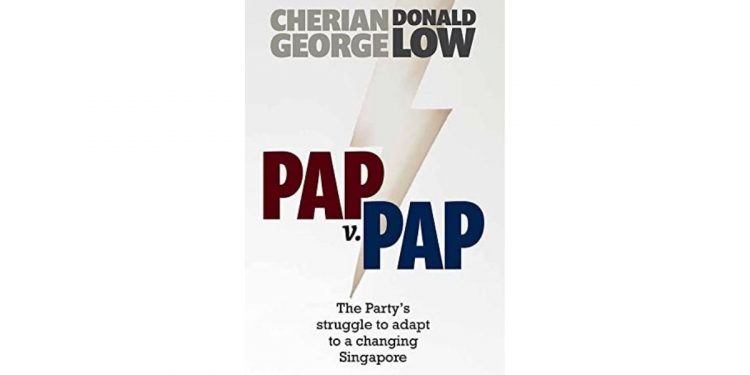Fill Me In
Last month Singaporean academicians Cherian George and Donald Low released a book titled PAP v PAP: The Party’s struggle to adapt to a changing Singapore where they discuss key issues that the ruling party might face in the changing Singapore’s landscape.
Who are the academicians?
George was a former Straits Times journalist where he was known for his collection of essays, Singapore: The Air-conditioned Nation which was first published in 2000.
Meanwhile Low was the Associate Dean for Executive Education and Research at the Lee Kuan Yew School of Public Policy.
Both professors are now based in Hong Kong to continue with their respective lecturing careers.
What is the book about?
In a virtual talk hosted by Academia.sg, both professors delved deep into the key ideas presented in the book which features past commentaries that they have written as well as new ones in response to the events in 2020.
The book is structured into three parts where the first part of the book lays out the context of the pandemic and the challenges that comes with it.
The second section focuses on the policy reform that we need to cope with post-pandemic, and the world that hyper-globalisation has produced.
Lastly, the third part of the book focuses on the longer systematic reform that Singapore needs whether it’s around reforming the media system in terms of democratic reforms or changes in policy-making.
What are the key issues raised in the book?
In the book, readers can expect to read about the ruling party’s internal struggles as it attempts to reunite long-held traditions with more progressive goals for the future.
PAP isn’t getting politics right
Citing the 2011 election and the 2013 population White Paper and more, George shared that the book has tried to understand “political naivety or blindness” of the party.
He also added that the PAP can do better on the policy side of things if it gets its politics right.
Meanwhile when asked, Low responded that he is “not at all optimistic” that the PAP can or will change. He felt that the system of governance in Singapore has been very competent and the people who are in the system have been quite successful. Hence, there were really no strong reasons to change and in fact, they would have all the incentive to remain the same.
Taking Trump’s dystopian ruling where there is a democracy revolt, Low highlighted that there is a need for Singapore to strengthen its system of elite governance by supporting it with democratic legitimacy rather than suppressing democracy.
The rise of populism
In the book, George also noted that the rise of populism in Singapore is another growing concern. He said that the PAP has “indulge[d] in populist temptations in worrying ways” by employing an “irrational kind of nationalist logic to beat down critics”.
The pair also noted that the populist culture is different compared to the time of the late Lee Kuan Yew, which was rather “anti-populist”.
George said that the book has alerted that the PAP’s increasing use of populist ideology and rhetoric will not only be bad for the public but also the party itself.
He further argued that the current elite governance has to be well-balanced with more transparency, competition and openness.
PAP’s need for internal reform
In the book, George and Low stated that a “reformed PAP that is comfortable with political competition” would be a good thing not only for the country as well as the party.
In order for an internal reform to take place, it will require a lot of moral courage from reform-minded PAP leaders to remodel the system.
However, they do understand that the book itself won’t change the hearts and minds within the PAP leadership but are hoping that it will spark conversations and spur action among Singaporeans.
Use of POFMA during GE2020
Even if objective citizens conclude that Protection from Online Falsehoods and Manipulation Act (POFMA) was a justified move against false statements or harmed the public interest, citizens may still view POFMA as a one-sided law since it can only be triggered by senior officials appointed by PAP ministers. All these has resulted in objective citizens to not be able to rely on POFMA to set the record straight especially when the mainstream media is already biased in favour of the ruling party.
Activists in Singapore
Singapore now prides itself on promoting the arts and social engagement. However, George, noted that it still “draws the line at public deliberation that could create a more democratic culture.”
How are people reacting to the book?
In the virtual event, Low shared that the response has centred on the book’s portrayal on the elite governance as defending the system instead of criticising it.
He pointed out the rise of nativist and populist backlash against elites is making the world a “darker and uglier place”.
“In this world, I think Singapore’s system of elite governance is, by comparison, going to be our competitive advantage and so it was important in this context to come up with reasons why we think this system of elite governance shouldn’t be abandoned even if it needs to be tempered with more democratic deliberations and democratic engagement,” he argued.
Both professors also noted that it was hard for both ends of the political spectrum (conservative vs anti-PAP) to fully agree with the book.
Join the conversations on THG’s Facebook and Instagram, and get the latest updates via Telegram.














